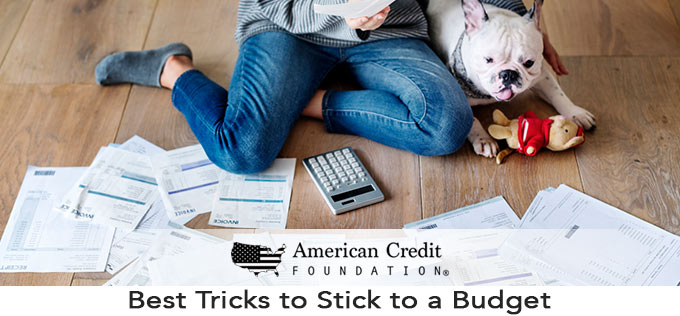
You surely know all about the values of a personal budget. We’ve said it before, and we’ll say it again: Budgeting builds financial stability – both day-to-day and long-term. Tracking your expenses and following a spending plan makes it easier to pay your bills on time, build your emergency fund, and attain your life goals.
And you get it. You diligently created your budget and had every intention of following that plan.
But now you’re finding that creating your budget and sticking to said budget are two very different beasts. This doesn’t have to be the case – read on for some simple tricks that you can incorporate into your daily life to dramatically ease the difficulty in following the financial plan you created.
Budget Tip 1: Adjust Your Attitude
Don’t look at your budget as a limitation. Instead, view it as a tool to reach your goals. You’re not punishing yourself – exactly the opposite! You’re moving toward your best life. Remember that not buying that second pair of boots this month gets you one step closer to affording that closet remodel next month.
Budget Tip 2: Lower Your Credit Card Limit
How many times has your lender sent a notification that you’re eligible for a higher spending limit? Do yourself a favor and politely decline – that “generous offer” often benefits them more than you. While it might help your credit score a bit (the credit bureaus consider your overall credit utilization, and a higher limit gives you more available credit), a higher spending limit allows you to blow way past your budget – and rack up more debt.
Budget Tip 3: Don’t Rush Major Purchases
Before you shell out a big chunk of your hard-earned dough, sleep on it – take some time to consider the purchase. If it isn’t something you need immediately, take a week to think about it before making the transaction. Ask yourself: Is this purchase really worth the cost? Will the purchase truly add value to your life, or just stress about your finances? Will you need to finance the purchase, and if so, will the payment plan mess up your budget?
Budget Tip 4: Shop Around
Humans are creatures of habit. It’s easy to walk the grocery store aisles and grab the same brand of toilet paper or frozen pizza every time. If you’re brand-loyal for a reason, obviously stick with it. But comparison shopping can end up saving you a lot, so experiment with different brands that are on sale or generally cheaper than your usual stand-by. You might even surprise yourself with a better discovery.

Budget Tip 5: Plan Your Meals
For most households, food and groceries account for a huge percentage of the budget. But if you don’t plan your meals – or shop with a list according to that plan – you’ll inevitably stray from your plan. And your budget will pay for it. Planning what you need for the week helps you avoid stocking up on items you don’t need. This also enables you to work with recipes that share ingredients.
Budget Tip 6: Shop Strategically
Another note about groceries: Do not buy your groceries when you’re hungry. Even armed with your shopping list, your growling tummy will entice you to add unnecessary items to your cart. If you’re someone easily tempted by fancy displays, skip the store entirely and shop online. This makes it easier to avoid impulse buys.
Budget Tip 7: Keep it Fun
Channel your inner Mary Poppins: Turn budgeting into a game to add some fun to the tasks. Gamify the process to reward yourself when you stick to your budget or reach a predetermined milestone. Track your daily financial activities – it can be a fun challenge to keep a streak going, especially when you start to notice some serious financial growth.
Budget Tip 8: Set Financial Intentions
Keep “the bigger picture” in mind by setting intentions for your finances. You might choose to eliminate cumbersome financial obligations or strive for financial stability. Unlike a specific financial goal (such as paying off your high-interest credit cards), financial intentions are more general targets that you aim toward. A clear aspiration in your heart can be a powerful motivator that spurs you to make progress and overcome barriers to success.
Remember, you made a budget for a reason. Whatever your financial goals, your budget will help you get there. But you have to stick with it. If you’ve tried the tips we discussed here and you’re still struggling to adhere to your budget, don’t despair. Reach out to American Credit Foundation and speak with one of our friendly financial counselors, who can share expert advice on a budget plan that will work for you.